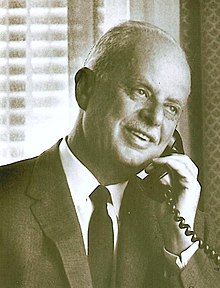Jack S. Liebowitz
| Jack S. Liebowitz | |
|---|---|

Jack Liebowitz working at the offices of DC Comics.
|
|
| Born |
Yacov Lebovitz October 10, 1900 Proskurov, Russian Empire (present-day Ukraine) |
| Died | December 11, 2000 (aged 100) Great Neck, New York, United States |
| Nationality | American |
| Occupation | Accountant, Publisher |
Jacob S. "Jack" Liebowitz (/ˈliːbəwɪts/; born Yacov Lebovitz October 10, 1900 – December 11, 2000) was an American accountant and publisher, known primarily as the co-owner with Harry Donenfeld of National Allied Publications (later DC Comics).
Jack Liebowitz was born Yacov Lebovitz in Proskurov, present-day Ukraine in October 1900, to a Jewish family. His mother, Mindl, never identified his biological father, her first husband (who had left the family), but married Yulyus Lebovitz when her son was three. Yacov soon adopted his stepfather's surname, and in 1910 the family emigrated to the United States. They arrived in the Jewish neighborhood of New York's Lower East Side and, as was common at the time, adopted Anglicized names: His parents became Julius and Minnie Liebowitz, while he became Jacob, soon shortened to Jack. Jack was a hardworking child and became a newsboy amongst other small jobs. In high school, he became adept at accountancy, a career he thought would help him escape his poor background.
By age 24, Liebowitz had earned his accounting degree from New York University, and by 1927 had married (Rose) and moved to The Bronx. Liebowitz set himself up as an accountant based in Manhattan's Union Square area, with one client, the International Ladies' Garment Workers' Union (ILGWU); his father had been a steward for that union since the early 1910s. By 1925, Liebowitz was in charge of the union's strike fund, and a year later managed to keep the fund solvent in the wake of a six-month, 50,000-worker strike. His business acumen placed Liebowitz in a position of high standing with the union officials. Toward the end of the decade, Liebowitz had taken on more clients and begun studying the . His initial dealings worked well for the union, but after the Wall Street Crash of 1929, funds plummeted and Liebowitz and the ILGWU parted company.
...
Wikipedia
